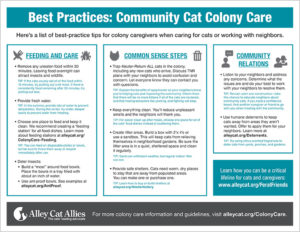Guide/How-to| Trap-Neuter-Return
Download: PDF
Here’s a list of best-practice tips for colony caregivers when caring for cats or working with neighbors.
Feeding and Care
- Remove any uneaten food within 30 minutes. Leaving food overnight can attract insects and wildlife.
- TIP: If the cats usually eat all of the food within 15 minutes, try putting out a bit more. If there is consistently food remaining after 30 minutes, try putting out less.
- Provide fresh water.
- TIP: In the summer, provide lots of fresh water to prevent dehydration. During the winter, try wider, deeper bowls to prevent water from freezing.
- Choose one place to feed and keep it clean. We recommend creating a ‘feeding station’ for all food dishes. Learn more about feeding stations at alleycat.org/ColonyCare-Feeding.
- TIP: You can feed on disposable plates or bowls, but be sure to throw them away or recycle immediately after use.
- Deter insects:
- Build a “moat” around food bowls. Place the bowls in a tray filled with about an inch of water.
- Use ant-proof bowls.
Common Sense Steps
- Trap-Neuter-Return ALL cats in the colony, including any new cats who arrive. Discuss TNR plans with your neighbors to avoid confusion and concern. Let everyone know they can contact you with questions.
- TIP: Explain the benefits of spay/neuter so your neighbors know you’re helping cats and improving the community. Inform them that there will be no more kittens if all of the cats are neutered, and that mating behaviors like yowling, and fighting will stop.
- Keep everything clean. You’ll reduce unpleasant smells and the neighbors will thank you.
- TIP: For easier clean up after meals, choose one place for all of the cats’ food dishes instead of scattering them.
- Create litter areas. Build a box with 2’x 4’s or use a sandbox. This will keep cats from relieving themselves in neighborhood gardens. Be sure the litter area is in a quiet, sheltered space and clean it regularly.
- TIP: Sand can withstand weather, but regular indoor litter can not.
- Provide safe shelters. Cats need warm, dry places to stay that are away from populated areas. You can make one or purchase one.
Community Relations
- Listen to your neighbors and address any concerns. Determine what the issues are and do your best to work with your neighbors to resolve them.
- TIP: Remain calm and constructivetake this chance to educate neighbors about community cats. If you need a confidence boost, find another caregiver or friend to go with you when meeting with the community.
- Use humane deterrents to keep cats away from areas they aren’t wanted. Offer to apply them for your neighbors. Learn more at alleycat.org/Deterrents.
- TIP: Try using citrus scented fragrances to deter cats from yards, porches, and gardens
For more colony care information and guidelines, visit alleycat.org/ColonyCare


